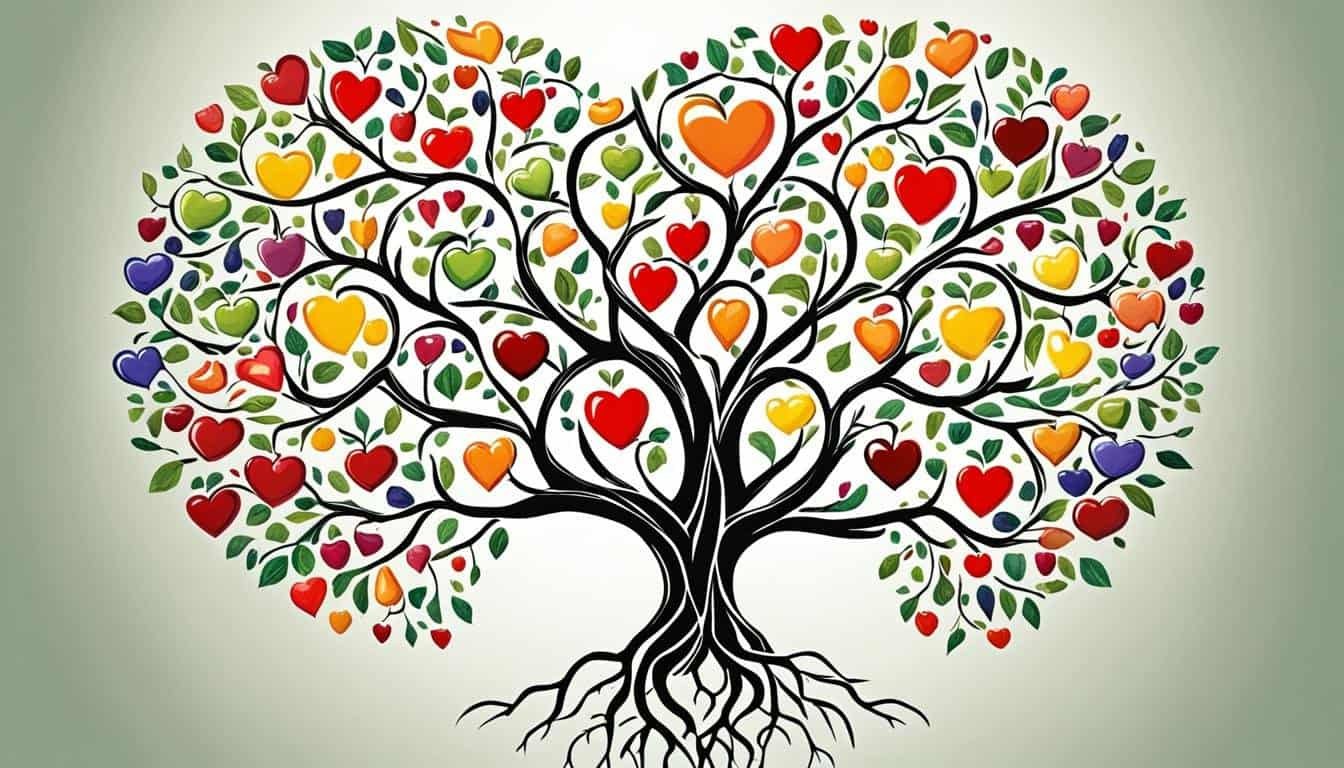Welcome, dear readers! Today, we embark on a journey to explore the transformative ways in which we can live out the powerful truth that love fulfills the law. Love is not merely an emotion; it is a force that can shape our lives and society for the better. So, how can we embrace love in all its fullness and experience its profound impact on our lives?
In this article, we will delve into ten practical steps that can help us nurture a life rich in compassion and connection. By embodying these practices in our everyday actions, we will unlock the true potential of love and witness its far-reaching effects on both ourselves and those around us.
Bulletpoints:
- Love has the power to fulfill the law and transform our lives.
- Practicing radical love encompasses extending kindness and compassion to everyone, regardless of their background or beliefs.
- Approaching situations with understanding and empathy allows us to see through the eyes of love, seeking the good in others even when they make mistakes.
- Forgiveness is an essential practice that brings healing and freedom, allowing us to let go of grudges and embrace grace.
- Serving others with a genuine care and compassion goes beyond actions, making a positive impact in their lives.
Love Radically: Don’t Limit Your Love to Friends and Family.
In order to truly live out the powerful truth that love fulfills the law, we must embrace a radical approach to love. It means extending kindness and compassion not just to our friends and family, but to everyone we encounter, regardless of their background or beliefs. Love knows no boundaries, and by breaking free from the limitations of our personal connections, we can foster a more inclusive and compassionate world.
Loving radically means stepping outside of our comfort zones and reaching out to others with open hearts. It requires us to let go of preconceived notions or prejudices and instead see every person as a fellow human being deserving of love and respect. Whether it’s a stranger on the street or a coworker from a different culture, our kindness and compassion can transcend differences and create genuine connections.
“Love and kindness are never wasted. They always make a difference. They bless the one who receives them, and they bless you, the giver.” – Barbara De Angelis
Loving radically also means actively seeking opportunities to make a positive impact in the lives of others. It could be through small acts of kindness like offering a helping hand or a listening ear. We can volunteer in our communities, donate to causes we believe in, or simply be present for someone in need. These acts of love not only benefit others but also bring joy and fulfillment to our own lives.
“Love is not patronizing and charity isn’t about pity, it is about love. Charity and love are the same — with charity you give love, so don’t just give money but reach out your hand instead.” – Mother Teresa
By loving radically, we can be a force for positive change in the world. Our actions of kindness and compassion, regardless of who the recipient may be, have the potential to create a ripple effect that spreads far and wide. We may never know the full impact of our love, but it has the power to transform lives and build bridges of understanding.
| Benefits of Loving Radically | Examples of Radical Love |
|---|---|
| 1. Creates a more inclusive society | – Organizing a community event that celebrates diversity |
| 2. Fosters genuine connections and friendships | – Engaging in meaningful conversations with strangers |
| 3. Breaks down barriers and prejudices | – Volunteering at a local organization that supports marginalized communities |
| 4. Spreads love and positivity | – Sending uplifting messages to friends and acquaintances |
| 5. Inspires others to practice love radically | – Sharing stories of acts of kindness on social media |
“Kindness in words creates confidence. Kindness in thinking creates profoundness. Kindness in giving creates love.” – Lao Tzu
In conclusion, loving radically means embracing a love that is boundless and all-encompassing. It requires us to extend kindness and compassion to everyone we encounter, regardless of their background or beliefs. By breaking free from the limitations of our personal connections, we can foster a more inclusive, empathetic, and loving world.
See Through Eyes of Love: Approach Situations with Understanding and Empathy.
To truly live out the truth that love fulfills the law, we must approach situations with understanding and empathy. It means seeing the world and the people in it through the eyes of love, seeking the good in others, even when they make mistakes.
When we see through the eyes of love, we open ourselves up to a deeper understanding of those around us. We recognize that everyone is fighting their own battles and carrying burdens we may not be aware of. By approaching situations with empathy, we can offer support and compassion to those who need it most.
Empathy allows us to connect on a deeper level, breaking down barriers and fostering meaningful relationships. When we seek to understand others, we create a safe space for them to open up and share their thoughts, emotions, and experiences. This genuine connection enables us to provide comfort, guidance, and support, ultimately strengthening our bond with others.
“When we see through the eyes of love, we open ourselves up to a deeper understanding of those around us.”
It’s important to remember that we are all imperfect beings who make mistakes. Instead of judging or condemning others for their faults, we can choose to see the potential for growth and transformation. By embracing empathy, we can offer forgiveness, second chances, and the opportunity for redemption.
When we approach situations with understanding and empathy, we shift our perspective from negativity to positivity. We choose to focus on the good in others, recognizing their strengths, and acknowledging their efforts. This mindset not only benefits those around us but also cultivates a sense of gratitude and positivity within ourselves.
Approaching Situations with Understanding and Empathy: Practical Tips
- Listen actively and attentively to others, without judgment or interruption.
- Put yourself in their shoes and try to understand their perspective.
- Offer support and encouragement when someone makes a mistake.
- Practice forgiveness and let go of grudges.
- Choose kindness and compassion as your default response.
When we approach situations with understanding and empathy, we create a ripple effect that has the power to transform lives. By challenging ourselves to see through the eyes of love, we can build a more compassionate and connected world.
Practice Forgiveness: Letting Go of Grudges and Embracing Grace.
Forgiveness is a powerful practice that allows us to let go of grudges and embrace grace in our lives. Holding onto grudges only harms ourselves, preventing us from experiencing true healing and freedom. Instead, we can choose to forgive freely, just as Christ forgave us.
When we hold onto grudges, we carry the weight of resentment and anger, which can negatively impact our mental and emotional well-being. It can strain our relationships and hinder our ability to fully love and connect with others. However, by practicing forgiveness, we can release ourselves from these burdens and create space for healing and growth.
“Forgiveness is the fragrance that the violet sheds on the heel that has crushed it.”
Forgiveness is not about condoning or forgetting the harm that was done. It is about acknowledging the pain and choosing to let go of the negative emotions attached to it. By forgiving, we free ourselves from the cycle of resentment and allow room for compassion, understanding, and ultimately, healing.
When we forgive, we choose to extend grace and love to those who have wronged us. This act of forgiveness reflects the unconditional love that Christ showed us, even in the face of our own imperfections. It is a reminder that we are all capable of making mistakes and in need of forgiveness.
Practicing forgiveness is a journey that requires patience and self-reflection. It is not always easy, but it is a necessary step towards living a life that embodies the truth that love fulfills the law. By forgiving others, we not only set ourselves free from the harm they have caused, but we also create an environment of love, understanding, and reconciliation.
Let us remember that forgiveness is a gift we give to ourselves. It is a choice to let go of past hurt and embrace a future filled with love, compassion, and growth. As we practice forgiveness, we can experience the transformative power it holds and create a ripple effect of healing in our lives and the lives of others.

Serve with a Loving Heart: Going Beyond Actions to Genuine Care.
Serving others with a loving heart is more than just going through the motions. It involves embodying a genuine desire to make a positive impact in the lives of those around us. When we serve with true care and compassion, we create a ripple effect of love and kindness that can transform communities and make a lasting difference.
At its core, serving with a loving heart means putting the needs and well-being of others before our own. It requires us to go beyond superficial acts of service and truly connect with the individuals we are serving. Whether it’s volunteering at a local shelter, helping a neighbor in need, or lending a listening ear to a friend, genuine care is the driving force behind our actions.
When we serve with a loving heart, we approach each interaction with empathy, kindness, and a desire to uplift others. We recognize the inherent worth and dignity of every individual, regardless of their circumstances or background. We strive to make a positive impact by meeting both their physical and emotional needs, offering support and encouragement along the way.
Here are some practical ways to serve with a loving heart and make a positive impact:
- Show up: Be present in the lives of those you serve, whether it’s through volunteering, mentoring, or simply being a reliable friend.
- Listen actively: Take the time to truly listen to others, offering them a safe space to share their joys, concerns, or struggles.
- Show kindness: Perform small acts of kindness, such as offering a smile, holding the door open, or lending a helping hand.
- Offer encouragement: Words of affirmation and encouragement can brighten someone’s day and help them feel valued and supported.
- Engage in meaningful conversations: Take the time to have genuine conversations with others, showing interest in their lives and experiences.
“Service is the rent we pay for the privilege of living on this earth.” – Shirley Chisholm
Serving with a loving heart is not just about the impact we have on others, but also the transformation it brings within us. It allows us to cultivate empathy, compassion, and a deeper understanding of the interconnectedness of humanity.
By serving with a loving heart, we create a world where genuine care and compassion are the driving forces behind our actions. Together, let’s make a positive impact and spread love to all those we encounter.
Speak Words of Love: The Power of Encouragement and Uplifting Words.
Our words have the power to build others up or tear them down. When we speak words of love, encouragement, and uplifting words, we have the ability to make a positive impact on those around us. It’s important to choose our words carefully and intentionally, using them to build others up and inspire them to be their best selves.
By speaking words of love, we create an atmosphere of kindness and compassion, nurturing deeper connections with those we interact with. Whether it’s a simple compliment, a word of encouragement, or a heartfelt affirmation, our words hold the power to uplift and inspire.
“Kind words can be short and easy to speak, but their echoes are truly endless.” – Mother Teresa
On the other hand, gossip and negativity can erode trust and damage relationships. Engaging in idle gossip can spread rumors, harm others, and breed negativity. Instead, let’s focus on speaking words that build others up and contribute to a positive environment.
When we avoid gossip and negativity, we create space for genuine connection and understanding. We can foster an atmosphere of trust and support, where everyone feels valued and uplifted. Let’s choose words that bring joy, comfort, and encouragement to those who need it most.
Remember, our words have the power to shape the world around us. Let’s use that power for good by speaking words of love and encouragement, and by building others up. Together, we can make a difference and create a community rooted in positivity and kindness.
The Impact of Words
| Positive Words | Negative Words |
|---|---|
| Love | Hate |
| Encouragement | Criticism |
| Uplifting | Discouraging |
| Support | Neglect |
| Kindness | Rudeness |
As seen in the table above, the impact of positive words, such as love, encouragement, uplifting, support, and kindness, can create an environment that fosters growth, happiness, and well-being. Conversely, the effect of negative words, such as hate, criticism, discouraging, neglect, and rudeness, can be detrimental to individuals and relationships.
Let’s choose our words wisely and consciously, embracing the power to build others up with love and encouragement. Together, we can create a world where uplifting words are spoken freely, fostering connections and building a community of compassion.

Put Needs Before Wants: Embracing Selflessness for the Well-being of Others.
In a world that often prioritizes personal desires and wants, embodying selflessness becomes a powerful way to deepen our connections with others and uphold the truth that love fulfills the law. Selflessness is the cornerstone of love, requiring us to put the needs of others before our own wants. By making sacrifices and prioritizing the well-being of those around us, we create a ripple effect of compassion and kindness.
When we choose to put the needs of others before our own wants, we demonstrate a profound commitment to love and empathy. It’s a conscious decision to prioritize the happiness and fulfillment of others, even when it may require personal sacrifice.
Embracing selflessness involves recognizing that our own desires should not overshadow the well-being of those we care about. It means setting aside our own agenda and being attuned to the needs of others. By doing so, we create an environment where love flourishes and genuine connections are nurtured.
“The greatest test of selflessness is putting others’ well-being above our own desires.”
Selflessness in Action
Here are several ways we can practice selflessness in our daily lives:
- Listen attentively: Give others your full attention when they speak, showing genuine interest and empathy.
- Offer help without hesitation: Anticipate the needs of others and offer assistance, even before being asked.
- Making sacrifices: Put the well-being of others first by willingly sacrificing your own time, resources, or comfort.
- Show compassion: Demonstrate empathy and understanding towards the challenges and difficulties faced by others.
- Practice forgiveness: Let go of grudges and forgive freely, just as love and sacrifice go hand in hand.
By prioritizing the needs of others, we not only enrich their lives but also cultivate a sense of fulfillment and purpose within ourselves. Selflessness is a powerful act of love that transcends personal desire, allowing us to experience the true essence of human connection.

Through selfless acts, we pave the way for deeper relationships, mutual understanding, and a community rooted in love. When love is selfless, it becomes a force that transforms lives and touches the hearts of those around us. Let us embrace selflessness as a way of life, embodying the truth that love fulfills the law.
Celebrate Others’ Successes: Overcoming Envy and Cultivating Genuine Happiness.
Envy is the opposite of love, but celebrating others’ successes can foster genuine happiness and strengthen our relationships. It’s all too easy to feel envious when we see someone achieve something remarkable or receive recognition for their accomplishments. However, instead of allowing envy to sour our hearts, we can choose to embrace joy and genuinely share in their happiness.
When we celebrate others’ successes, we not only uplift their spirits but also create an environment of warmth and support. By cultivating genuine happiness for others, we become more open-hearted and compassionate individuals. This shift in mindset allows us to truly appreciate and acknowledge the achievements of those around us, fostering deeper connections and fostering a sense of unity.
“The greatest reward is seeing others succeed.”
Byron R. Pulsifer
To overcome envy and cultivate genuine happiness, we can practice the following:
- Be genuinely happy: When someone achieves something significant, let go of any feelings of envy and sincerely celebrate their success. Allow yourself to bask in their joy and share in their triumph.
- Praise and recognize: Take the time to acknowledge the hard work, dedication, and talent that led to their accomplishments. Offer heartfelt congratulations and express admiration for their achievements.
- Share their joy: Whether it’s throwing a party, sending a heartfelt message, or simply spending time together, actively participate in the celebration of their successes. Show them that their accomplishments matter to you, and that you are genuinely thrilled for them.
- Learn from their journey: Instead of allowing envy to eat away at you, view others’ achievements as an opportunity for growth and inspiration. Learn from their experiences, and let their successes inspire you to strive for greatness in your own life.
- Offer support: In addition to celebrating their successes, be there for them during challenging times as well. Offer support, encouragement, and assistance whenever needed.
By shifting our focus from envy to celebrating others’ successes, we not only contribute to a more positive and uplifting world but also nurture genuine happiness within ourselves. Let us choose joy over envy and spread love and support to those around us.

| Envy | Celebrating Others’ Successes |
|---|---|
| Leads to bitterness and resentment | Fosters joy and genuine happiness |
| Drives a wedge between relationships | Strengthens and deepens connections |
| Creates a negative and toxic mindset | Cultivates a positive and supportive mindset |
| Diminishes personal growth and development | Inspires personal growth and learning |
Show Patience: Understanding Flaws and Shortcomings with Love.
Love is a virtue that calls us to show patience and understanding towards others, even in the face of their flaws and shortcomings. Just as God is patient with us, we too can extend the same grace and compassion to those around us.
Patience is not simply waiting for someone to change or improve, but rather it is the willingness to accept and embrace them as they are, flaws and all. It is an active expression of love that seeks to understand others on a deeper level.
When we show patience, we demonstrate our commitment to building genuine connections and fostering a more loving environment. Instead of focusing on the imperfections of others, we choose to see the goodness and potential within them.
“Patience is not simply waiting for someone to change or improve, but rather it is the willingness to accept and embrace them as they are, flaws and all.”
By recognizing that we too have our own flaws and shortcomings, we create empathy and foster a sense of unity with those around us. We can relate to their struggles and extend grace, just as we have received it ourselves.
Showing patience does not mean condoning harmful behavior or ignoring necessary boundaries. Rather, it is a compassionate response that seeks to understand the reasons behind someone’s actions and offer support and guidance, when appropriate.
When we embrace the practice of patience, we let go of judgment and criticism, and instead choose love and acceptance. We create space for growth, forgiveness, and healing in our relationships.
Let us strive to show patience towards others’ flaws and shortcomings, just as God is patient with us. By doing so, we embody the transformative power of love and contribute to a more compassionate and understanding world.
Key Takeaways:
- Showing patience towards others’ flaws and shortcomings is an expression of love and understanding.
- Patience involves accepting and embracing others as they are, while recognizing our own imperfections.
- By showing patience, we foster genuine connections and create a more loving environment.
- Patience does not mean condoning harmful behavior, but rather seeking to understand and support others.
- When we practice patience, we let go of judgment and create space for growth, forgiveness, and healing.
How Can Loving Your Enemies Help Fulfill the Law?
Loving your enemies can lead to the blessings of loving enemies. By doing so, you are following the teachings of fulfilling the law through kindness and forgiveness. It can bring about peace and understanding, while also demonstrating a depth of character that goes beyond the ordinary expectations of human behavior.
Practice Active Listening: Building Connection Through Genuine Care.
Love is about connection and conversation, and one of the most powerful ways to foster this connection is through practicing active listening. By giving our genuine attention to others, we show them that we truly care and value their thoughts and feelings. Active listening involves not only hearing the words that are being said but also understanding the underlying emotions and perspectives.
When we practice active listening, we create a safe space for open and honest communication. We give others the opportunity to express themselves fully, without judgment or interruption. This fosters a deeper understanding and connection, as we provide the space for their thoughts and feelings to be heard and validated. Through active listening, we acknowledge the importance of their words and show them that their voice matters.
Active listening requires patience, empathy, and a genuine desire to understand. It involves not only listening to the words spoken but also observing body language and non-verbal cues. By fully engaging in the conversation and asking thoughtful questions, we demonstrate our sincere interest in the other person and their experiences. This level of attentiveness helps us build strong, meaningful relationships based on trust and mutual understanding.
So, let us practice active listening as a way to build connection and strengthen our relationships. By giving our genuine attention to others and showing them that their thoughts and feelings are valued, we can create a loving and supportive environment where meaningful conversations thrive.
Affiliate Disclosure: "As an Amazon Associate I earn from qualifying purchases made from links in this post. We are a participant in the Amazon Services LLC Associates Program, an affiliate advertising program designed to provide a means for us to earn fees by linking to Amazon.com."

